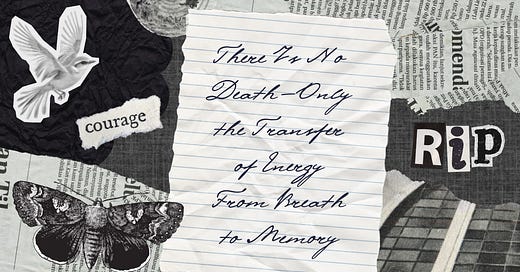There Is No Death—Only the Transfer of Energy From Breath to Memory
On the persistence of life beyond physical form
I sometimes imagine the moment of death—that strange electric current passing between worlds. The final breath lingering in the air, molecules rearranging themselves, transforming from one state of being into another.
Not disappearing. Never disappearing. Just changing form, like everything else in this universe.
Science tells us energy cannot be created or destroyed. Only transferred. Changed. Rearranged.
But we forget this truth when we lose someone. We say they're gone, as if a person could simply vanish from existence, like they were never here at all.
What bullshit.
The quantum entanglement of grief
Last night I found myself staring at an old photograph. Hands weathered by time—fingers that once created, nurtured, loved. Now, those hands exist only in calcium and memory; their physical form returned to the earth while something else—something quantum and immeasurable—lives on in the neural pathways of those who remember.
In quantum physics, there's this mind-bending concept called entanglement. Two particles, once connected, remain mysteriously linked across any distance. Change one, and the other changes too, instantaneously, defying our classical understanding of space and time.
Grief works the same way.
The living and the dead, entangled at the subatomic level. Physical forms gone, and yet they change us still. Their laughter echoes in ours. Their way of seeing beauty in broken things shapes how we move through the world. The energy that was their consciousness hasn't vanished—it's redistributed and taken up in new forms.
We are the ongoing experiments that prove they existed.
What if we've been wrong about death this whole time
We've built entire religions and philosophies around this idea that death is an ending, a grand finale—a curtain call. We've convinced ourselves that what makes us us somehow vanishes when our hearts stop beating.
But what if that's just a failure of imagination?
Energy doesn't die. It transfers.
When you speak, sound waves travel from your vocal cords through air molecules, vibrating against another person's eardrum, transforming into electrical signals their brain interprets as meaning. Your thoughts become their thoughts. Your energy becomes their energy.
And what is memory if not the preservation of that energy?
Every story told about someone who's died. Every habit unconsciously adopted from a parent. Every song that reminds you of someone you've lost. These aren't just metaphors or poetic comforts—they're literal energy transfers, the redistribution of consciousness across time and space.
The universe runs on this principle. Stars collapse, their matter scattered across galaxies, becoming the building blocks of new worlds, new life. Your body contains elements forged in the hearts of ancient stars.
We are, quite literally, walking amalgamations of energy that once existed in other forms.
The second law of grieving
Entropy increases in a closed system, physicists tell us. Everything trends toward disorder. But consciousness fights against this law, creating patterns, preserving information, passing energy from one generation to the next.
When my friend's father died last year, he told me something that broke me open: "I keep finding myself doing things exactly the way he would have done them. Using his exact phrases. Making his exact jokes. It's like he's hijacked my nervous system."
I didn't have the heart to tell him that's exactly what happened—a slow process of inhabiting another’s energy through the process of life.
The specific arrangement of atoms that was his father no longer exists in that configuration. But the energy—the patterns, the information, the essence—continues to ripple outward, affecting the physical world through everyone who carries those memories.
We are not closed systems. We are entangled with everything and everyone we've ever known.
What actually remains
Science confirms what the poets, and philosophers, and deeply emotional individuals have always known. Nothing is ever truly lost. Matter changes form. Energy transfers. Information persists. Always.
That's not spiritual woo-woo. That's thermodynamics.
When someone you love dies, they don't disappear. Their energy—the unique pattern that constituted their being—redistributes itself. Some of it goes into the ground. Some into the air. And some of it goes into you.
You become the vessel for their continued existence in this world.
Every memory you have of them is a physical, neurological reality—electrons flowing through specific pathways in your brain, maintaining patterns that correspond to who they were. Every story you tell about them ripples outward, creating new pathways in other brains, extending their energy further into the future.
This isn't metaphorical. This is actual fucking physics.
The observer effect of love
In quantum mechanics, the act of observation affects what's being observed. Consciousness itself is a force that shapes reality.
When you remember someone, you're not just passively recalling information. You're actively reconstructing them, maintaining the specific energy pattern that made them who they were, pushing back against entropy's pull toward disorder and forgetting.
Love is not just an emotion. It's a force of nature. A mechanism for energy preservation.
So maybe death isn't the end of a person but the beginning of their transformation. From contained consciousness to distributed memory. From localized energy to dispersed influence. From one form of existence to another.
And, if that energy never dies but only transfers, then how we live becomes infinitely more important. The patterns we create. The memories we leave behind. The way our energy will ripple through the consciousness of others long after our hearts stop beating.
Death isn't an ending, but a transformation, from breath to memory.






I was scared to read this as several years out some of the grief of losing a parent is still fairly raw. But then I did. And it was lovely. I love how you validated the continuing attachment to those we've loved and lost as not something woo-woo but as science!
You have articulated every detail of my own experience/belief so perfectly, I am dumbfounded. Wow.